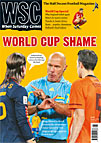 Despite a respectable performance in South Africa some think the US could have achieved more. Ian Plenderleith explains why
Despite a respectable performance in South Africa some think the US could have achieved more. Ian Plenderleith explains why
When US coach Bob Bradley substituted Ricardo Clark 30 minutes into the team’s final World Cup game against Ghana, he whispered intensively into the player’s ear for several seconds before packing him off to the bench. As Clark’s sole contributions in his half hour had been to lose possession in the lead up to Ghana’s opening goal, and to receive a yellow card for an amateurish late tackle, there was much lively speculation about the words Bradley had directed towards the central midfielder.
Possibility number 1: “This is the official line. You have a hamstring problem. As soon as I let you go, hobble. You tell the other players, the press, and all your friends and family you have a hamstring problem. Now go, and start limping now!” Possibility number 2: “I made you look stupid by starting you against England and Ghana, and you are clearly out of your depth. You made me look stupid by being the direct cause of us conceding an early goal in both games. So we’re quits. Please don’t ever talk to me again or try to contact me or my family.” Possibility number 3: “I took you off before Eintracht Frankfurt realised you’re the same player they signed last winter. Get yourself some plastic surgery and a new name, and you may still have a career. And me too, if we manage to turn this game around.”
Of course the US weren’t just eliminated because Bradley started the Ghana match with Clark in midfield. But that one decision goes a long way to explaining why they only progressed so far, despite the once-in-a lifetime chance to make it through to the semi-finals without having to face a major world footballing power. Although Bradley corrected his error by swapping Clark for Maurice Edu, a more astute coach would never have taken a player like Clark to South Africa in the first place. Back in 2007 as a Houston Dynamo player, Clark was banned for nine games of the MLS season for aiming a spectacularly violent kick at FC Dallas’s Guatemalan striker Carlos Ruiz, who was already lying on the ground having taken a bit of a flop in an attempt to win a penalty. Clark was lucky to receive such a mild punishment. At the time, he had made just a handful of appearances for the US, but most thought that this would be the end of his international career. How could a player with such a temperament be relied upon to keep his cool in feisty qualifiers away in Central American countries, let alone take part in a World Cup?
Yet Bradley persevered with Clark, and took him to the 2009 Confederations Cup, where a second big red warning card was waved in his face when Clark received a straight red for kicking Gennaro Gattuso in the US’s game against Italy. Seen enough, Bob? Apparently not, for Clark continued to play, scoring a lovely long-range winner in a 1-0 win over Trinidad & Tobago for his second international goal. This flash of excellence was enough to convince Bradley that Clark should be a regular, and not even the slack defending that allowed Steven Gerrard to score in South Africa stopped Clark starting against Ghana.
It’s telling that Clark has spent almost all of his career in MLS, and that since moving to Frankfurt in January has played only three times in the Bundesliga due to injury. There were only four other players from MLS in the US squad, and one of those was the outstanding Landon Donovan, fresh from a good spell with Everton. It’s clearer than ever that the players best equipped to face top international opposition are those who have played their football outside the US. Clear, that is, except for the extraordinary leeway granted from Bradley to a player like Clark. Yet we had this discussion four years ago, after the ill-disciplined Pablo Mastroeni – another middling MLS player with Colorado Rapids – was sent off against Italy in Kaiserslautern at the 2006 World Cup in a game that was there for the taking. The US played well in patches in South Africa and provided much excitement for an increasingly engaged home audience. But they seem slow to learn tough lessons at a time when they are still playing catch-up with countries boasting decades more experience and history.
The prosaic Bradley’s done an adequate job in his four years, and although his many advocates seem to think that a second round placing is good enough, others feel it’s time for a more dynamic coach. At the time of writing, Bradley’s position was still under consideration from the US Soccer Federation. All it would take to remove him is a firm signal from Jürgen Klinsmann, who came close to taking the job four years ago, that this time he’s prepared to agree terms. It could be just the bold move needed to take the US team a level or two higher in 2014.
From WSC 282 August 2010